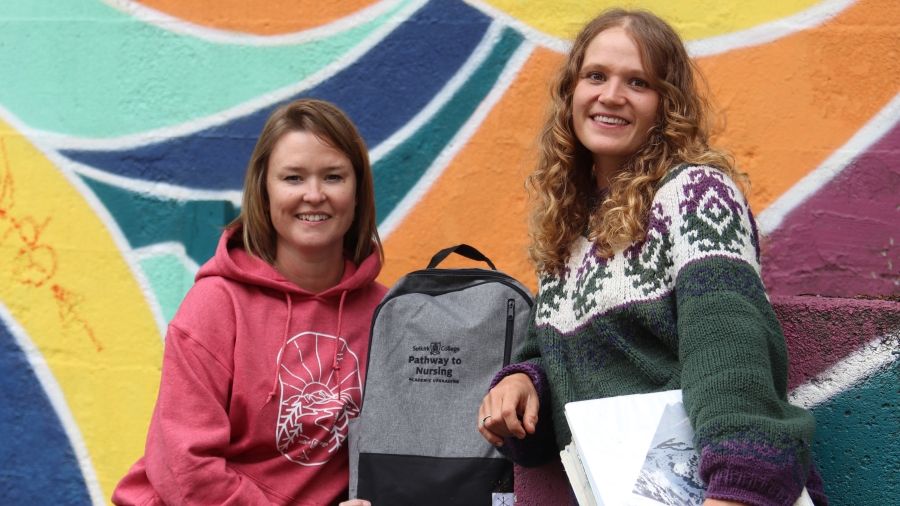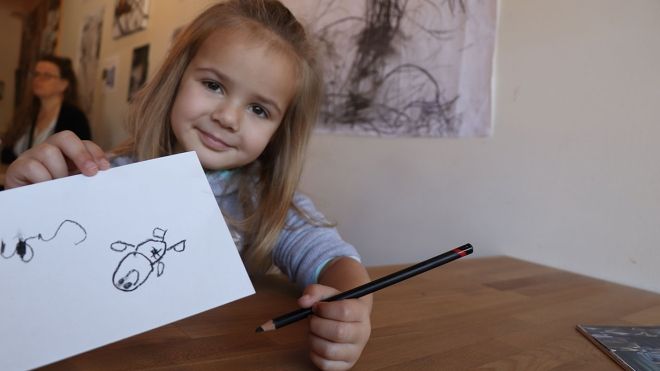Early Childhood Care and Education - Certificate
Overview
The Early Childhood Care and Education certificate program offers students the knowledge, skills and abilities to work with young children and their families.
*This program may be eligible for the post-graduation work permit (PGWP).
The Early Childhood Care and Education Certificate will be offered online in Fall 2026. If you are interested in taking the program on campus instead, please add your name to our interest list below.
* We require a minimum of 20 interested students to run an on-campus, face-to-face intake.
Program Pathways
Early Childhood Care and Education - Certificate
This nine-month program will prepare you to start a rewarding career or ladder into programs for further specialization.
Early Childhood Care and Education - Inclusive Practice Advanced Certificate
After you complete the Early Childhood Care and Education - Certificate, ladder into this program to meet the educational requirements of the BC ECE Registry Special Needs Educator Certification.
These courses may be used as credits toward the Human Services Diploma in Early Childhood Education.
Early Childhood Care and Education - Infant/Toddler Advanced Certificate
After you complete the Early Childhood Care and Education - Certificate, ladder into this program to meet the educational requirements of the BC ECE Registry Special Needs Educator Certification.
These courses may be used as credits toward the Human Services Diploma in Early Childhood Education.
Pursue a Human Services Diploma
After you complete the Early Childhood Care and Education - Certificate, ladder into this program to get career-ready or transfer into a degree program.
Funding Options
Don't let the cost of studying in Early Childhood Care & Education stop you from pursuing your dream. Funding opportunities are available.
- ECE Student Bursary Program (delivered through ECEBC)
- CBT ECE Workforce Development Fund
- Selkirk College Student Awards and Financial Support
- Now recognized for Canada Student Loan Forgiveness: Graduates of the ECCE program may now be eligible for federal loan forgiveness when working in designated early childhood education roles.
Accessibility & Flexibility
Choose your study option:
- Online: With in-person practicums either in the Kootenays or in your home community.
- Blended (for international students or students who prefer in-person learning): Blend of online asynchronous and on-campus classes, practicum in the Kootenay/Boundary area.
- Flexible schedule: All ECCE Certificate courses can be completed full-time or part-time.
Contact Admissions for more details.
Take this Program If You:
- Are passionate about early education
- Value trusting and respectful relationships
- Are open to learning and critical reflection
- Support children's rights, inclusion and equity
"Respectfully living and learning together"
British Columbia Early Learning Framework, 2019, p 12
ECCE students learn how to create a welcoming, responsive and inclusive environment through an ethic of care. Through creative and inquiry-based learning, early childhood educators co-create knowledge with children, imagining more just and equitable worlds.
Your Path to Professionalism
Understand the role of the early childhood educator through:
- Critical reflection
- Experiential learning
- Historical and political contexts
You will experience small class sizes and instructors who are committed to excellence in education and professional practice.
News
Program Outcomes
Upon successful completion of this program, students will be able to:
- Co-construct an authentic, effective and relevant learning experiences based on observation and documenting children’s emerging interests, skills and development
- Guide and facilitate learning developed through intentional provocations that support all domains of development
- Interpret and guide children’s behaviour in a respectful and responsive manner to support healthy social development
- Ensure a safe, healthy, and nurturing environment that fosters individuality and exploration while adhering to recognized regulation
- Apply and interpret relevant regulations and policies in order to perform required administrative responsibilities within the early childhood field
- Develop a trusting and collaborative relationship with each family that honours diversity, values and culture
- Interact ethically, culturally, and inclusively using appropriate oral, non-verbal and written communication skills with children, families, colleagues and community
- Develop a network of community and inter-professional partnerships and advocate for the needs of families and individuals
- Demonstrate positive, compassionate and ethical work behaviours while reflecting on the impact of personal values and attitudes on the development of healthy relationships with children and their families
- Promote a collaborative environment which is respectful of individual differences, encourages diversity and celebrates effective communication
- Advocate for the resources required to deliver quality programs by creating public awareness and obtaining recognition for the profession
- Exhibit positive professional behaviours, critical thinking and a commitment to lifelong learning that maximize opportunities for successful employment, increased responsibilities and career advancement
- Participate in a mentorship relationship by sharing professional experience, being a positive role model and being an effective team member
Admission Requirements
Official transcripts from high school or post-secondary institutions (mailed directly from the Ministry of Education and educational institutions) showing the following:
- Grade 12 or its equivalent (consideration will be given to mature students)
- English Studies 12 or equivalent with a minimum of 60% or higher
- Proof of a negative tuberculosis test or of a clear chest X-ray that is less than 6 months old for those who have been requested to have this from our community partners
- A current criminal record check from the Ministry of Justice must be completed within 90 days of program start date. Some types of criminal records may limit or prohibit acceptance in field placement; acceptance into field placement is a requirement for program promotion.
- Current resumé
- Personal statement of interest (250 words)
Information on these requirements can be found in the application package.
An orientation session is required and will be arranged by the program designate.
Students applying to the diploma program immediately following completion of a Human Services certificate program, may request that the contents of their file be transferred.
Other Information
- N.B. A scheduled orientation and interview session with Early Childhood Care and Education instructors will be held to discuss the nature of the ECCE program and requirements for practicum placements.
- Students may apply for an ECE Assistant Certificate after successful completion of first semester Child Health & Safety Course (ECCE 186).
- The Early Childhood Care and Education certificate program is the prerequisite for post-basic training programs.
- In addition to usual expenses for fees and books, students have added expenses for regular travel to area early childhood centres. Individuals enrolling in the program are advised that access to a reliable vehicle is necessary as travel to centres is the responsibility of the student.
APPLICATION PROCESS
1. CERTIFICATE, ADVANCED CERTIFICATE& DIPLOMA PROGRAMS
Students applying to the diploma program immediately following completion of a Human Services Certificate Program, may request that the contents of their file be transferred.
2. PART-TIME STUDIES IN HUMAN SERVICES PROGRAMS
a) Acceptance to an individual course does not constitute admission to the program. All program admissions will be considered according to Part I, A: Admissions Requirements.
b) The ECCE, EACSW, SSW Certificate programs and the Human Services Diploma program may be completed on a part-time basis depending on number of spaces available. Students choosing to complete a program on a part time basis must meet with a program coordinator, councillor and/or School Chair at the time of acceptance to plan a course of studies.
c) Students who have been accepted for part time studies and are in good standing academically will normally be accepted upon re-application to the next term. Refer to Part II, Section B, Promotions re: academic requirements.
In order to receive your credential in your program, you must maintain a minimum GPA of 2.00 and a minimum of 60% or better in all semester courses.
B. PROMOTION
1. In order to progress to the next semester, the following requirements must be met.
a) Completion of all courses in the semester with a minimum overall cumulative GPA of 2.00 and a grade of a “C” or better in all semester courses.
b) Promotion to the second year of the Diploma program requires a cumulative GPA of 2.33 during the first year of studies or School Chair approval
2. Promotion to practicum will be determined by the following criteria:
a) A grade of "C" or better in all required courses as defined in Part II, C, Graduation Requirements.
b) Some types of criminal records may limit or prohibit a student's acceptance in field placement agencies. Ability to be accepted into field placement is a requirement for admission and promotion.
3. A student’s performance will be reviewed by program faculty when:
a) Grades in one or more courses fall below a “C”.
b) Unacceptable behaviour, inappropriate interpersonal skills, and/or patterns of absence are displayed (as outlined in program policies).
c) On probation.
4. Considerations for practicum placement:
a) Practicum placements are normally completed within the College region.
b) To avoid a conflict of interest, students are expected to inform instructors of agencies where family and/or personal connections exist.
c) Practicum placements will be arranged by a program instructor.
d) Agency staff will be informed if a student has refused to sign a waiver authorizing the College to share personal information about the student with agency staff.
5. Students will not be placed in practicum based on the following:
a) The student has not demonstrated readiness for practicum placement.
b) Two agencies refuse to accept the student in practicum placement.
c) The student lacks means of transportation.
6. Practicum evaluation will be based on:
a) A review of the student's performance in relation to stated course competencies.
b) A joint review comprised of college instructor, agency supervisor and student.
c) Completed practicum assignments.
In order to graduate with Honors students must meet all program requirements with no grades less than a B- and a cumulative GPA of 3.5 or higher.
Courses
ECCE168 - Observing and Reflecting Practicum I
ECCE 168 Observing and Reflecting Practicum I is an experiential course with field placements and lectures integrating theories and practices in the early years. Through engagement with early childhood educators in practicum learners will participate in professional practice; plan and evaluate a developmentally appropriate program that meets the observed needs of children. Learners will explore how pedagogical narrations inform practice through observing, collecting traces, collaborating and reflecting. Utilizing a ‘common world’s’ framework, including indigenous world views, learners will have opportunities to explore the interrelationship of living and non-living things.
ECCE178 - Professional Practice I
ECCE 178 Professional Practice I provides an overview of the field of early childhood education from a theoretical perspective influenced by both historical and current contexts. Learners will have the opportunity to engage with a variety of program models and structural components such as the BC Childcare Licensing Regulation, the Early Learning Framework of BC and the Occupational Standards for Early Childhood Educators. Using these guiding frameworks and theories learners will demonstrate an understanding of standards of practice and childcare administration.
ECCE186 - Child Health and Safety
ECCE 186 Child Health and Safety is on personal wellness and the planning, establishment and maintenance of a safe and healthy environment in programs for children from birth to school age. Topics include: food preparation and handling; planning nutritious snacks and meals; universal precautions; diapering and toileting; accident prevention and hazard identification; medication; illness management, assessment and reporting; modelling healthy practices and utilizing community health resources.
ECCE188 - Planning with Young Children I
ECCE 188 Planning with Young Children I provides opportunities to learn about warm, caring, responsive relationships and emotionally safe, child-centered environments. The course focuses on application of theories, planning experiences and environments to support children’s development. Students explore the areas of art, music, movement, literature, and drama within the conceptual frameworks of developmentally appropriate practice, the competent child, diversity, child-centred environments, sensory motor exploration, emergent curriculum and creativity.
ENGL110 - College Composition
ENGL 110 introduces students to the world of scholarly writing -- reading it, thinking about it, and producing it as academic researchers. Students will explore how professional and/or academic writers across disciplines communicate to a variety of audiences. Students will practice active reading, writing and critical thinking skills by conducting scholarly research on a topic. This course aims to equip students with the skills and knowledge they need to write effectively within academic contexts.
HSER174 - Interpersonal Communications
HSER 174 Interpersonal Communications provides the student with an opportunity to examine personal goals, values and attitudes; develop and practice listening and responding skills, and become more aware of personal strengths and limitations. This course is designed to help students gain self-understanding in order to be more effective in working with people.
PSYC100 - Introductory Psychology I
PSYC 100 Introductory Psychology I is an introduction to the methods, theory and practice of psychology as a science. Among others, topics will include motivation and emotion, learning and memory, biological foundations, sensation and perception. Other topics are added at the discretion of the individual instructor. Class demonstrations and activities are used to illustrate concepts. Teaching methods and resources in the course vary with the instructor.
ECCE169 - Observing and Reflecting Practicum II
ECCE 169 Observing and Reflecting Practicum II is designed to integrate theories and practices in the ECCE field. Students will observe and participate in regional early childhood programs off campus. The clinical practicum provides opportunities to practice observing and recording children's individual abilities and interests over time, and, reflective practice and professional conduct.
ECCE179 - Professional Practice II
ECCE 179 Professional Practice II examines early childhood care and education in a historic and current cultural context. Using a variety of theories, including the bioecological approach learners will reflect on the impact of their personal values and attitudes on their professional practice.
The principles of inclusive practice when working with young children and families will be examined, and the importance of play in learning will be identified through exploring the theory and its benefits. By the end of the course learners will have gained a sense of professionalism and will be able to advocate for the profession of early childhood care and education. Current frameworks and theories will be used to develop positive, compassionate and ethical professional values.
ECCE189 - Planning with Young Children II
ECCE 189 Planning with Young Children II builds on the concepts and theories of ECCE 188 with an emphasis on play theory, social relationships and skills, and creative and cognitive processes in children ages three to six years. Learners examine the interface of adults and children in a child-centred environment. Learners study ways of supporting and extending the interests, understandings and problem-solving abilities of young children in the areas of mathematics, science and social studies. The focus will extend to the programming context with a holistic approach to the practitioner as planner and adult within the play environment and address variations in development, abilities, issues, and risk factors.
ECCE193 - Child Centered Partnerships I
ECCE 193 Child Centered Partnership I, learners reflect on values, beliefs and attitudes toward building warm relationships with children. Understanding of self within the guiding relationship is developed. With the use of problem-solving techniques, students learn the skills of guiding and caring for children and creating emotionally safe, respectful environments that are empowering and that enhance friendships, responsibility, self-discipline, self-worth, and maximize potential.
ECCE195 - Practicum I
ECCE195 Practicum I provides the learner with practical experience in an early childhood centre. Students integrate learning and demonstrate skills in interpersonal communication, observing and recording children's responses and abilities, program planning, guiding and caring and growing professional awareness. Seminars are scheduled for reflective discussion of practicum learning.
FAM180 - Family Dynamics
FAM 180 Family Dynamics is designed to provide students with a variety of theoretical perspectives to understanding families. It considers the diversity of families through the lenses of the life course perspective and political policies. Family formation, parenting, separation and divorce and aging are all examined. Family issues are also considered, including marriage and death rituals, work and poverty, same sex relationships, disabilities and immigrants. Policies that affect families are explored through an examination of violence in the family and political trends. The course is intended to be a foundation for further study of families.
PSYC240 - Child Development
PSYC 240 Child Development is an introduction to normal child development; this course explores selected aspects of the physical, cognitive, emotional, and moral development of children from birth to middle childhood; and examines the major theories of child development.
ECCE293 - Child-Centered Partnerships II
ECCE 293 Child-Centred Partnerships II, concepts and skills of ECCE 193 are further developed and enhanced; for example, understanding of self within the guidance relationship, creating emotionally safe and respectful environments and enhancing autonomy. Students examine guiding relationships and apply principles and skills to complex situations. Students will also have the opportunity to learn about the various community partners and their role in supporting young children.
ECCE294 - Practicum II
ECCE 294 Practicum II, students synthesize learning with practical application. The focus is on collaboration with families and community in the creation of inclusive, responsive, culturally-sensitive child-centered environments for young children. Learners continue to engage in the process of self-reflection and individual goal setting regarding exemplary professional practice. Seminars are scheduled for reflective discussion of practicum learning.
Tuition & Fees
All amounts are estimates and are subject to change. Tuition amounts are based on a full-time course load. Please note that many programs have additional costs beyond those listed here. For more information, please visit Tuition & Fees.
Find Out More
We look forward to connecting with you! Fill out this form and we'll reach out to you.



